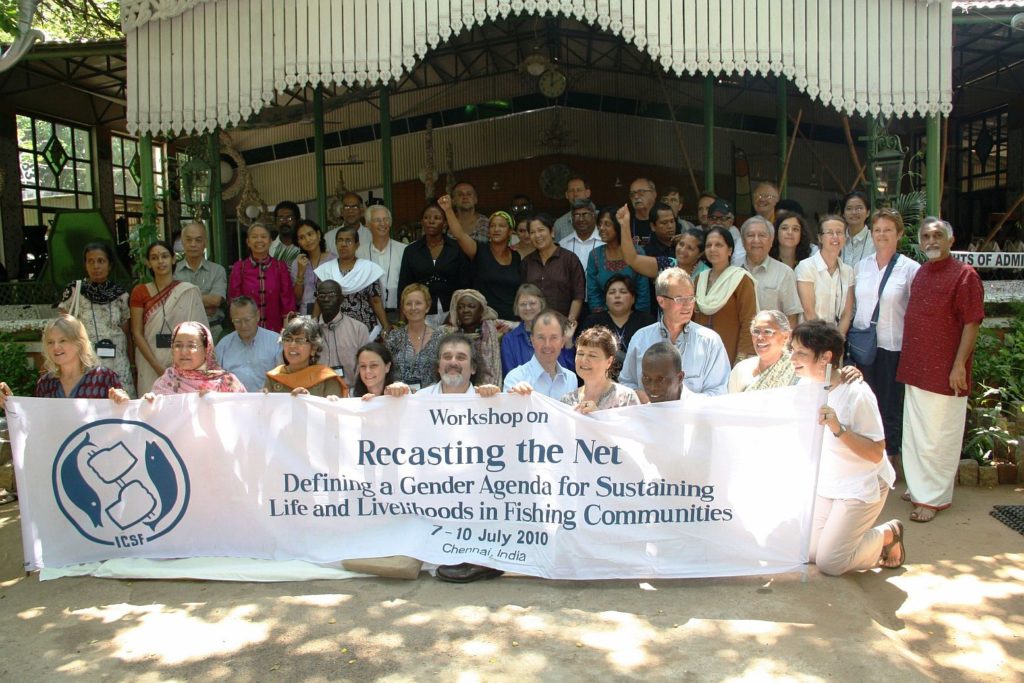 A DEEPER FEMINIST PERSPECTIVE TO BENEFIT FISH AND FISHING COMMUNITIES
A DEEPER FEMINIST PERSPECTIVE TO BENEFIT FISH AND FISHING COMMUNITIES
18 October | Bangkok: Unsustainable practices in global fisheries and aquaculture have impacted on women in the sector, highlighting the need for a strong feminist framework to inform policy and development approaches toward socially and environmentally-just fisheries.
Deepening the feminist perspective in fisheries will be the key focus of a special workshop by Nalini Nayak and Cornelie Quist, founding members of the International Collective in Support of Fishworkers (ICSF), at ‘Expanding the Horizons’, the 7th Gender in Aquaculture and Fisheries conference in Bangkok on 18-22 October.
Nalini Nayak, General Secretary, SEWA Bharat: “Gender mainstreaming in fisheries has gained importance in the last decade or more, facilitating a growing awareness and increased documentation of the role and space that women occupy in fisheries. Despite this, development interventions continue to be weighed heavily against women and fisheries policies are often gender-blind and patriarchal.
“At the same time, the thrust to increase fish production and economic wealth has created harm through destructive fishing technologies and practices, ‘ocean grabbing’, vertical fish value chains and growing centralized policy measures. These activities impinge on the nurture dimension of fisheries and the sensitive ecosystem it requires, as well as on the well-being and self-reliance of fishing communities and fishworkers.
 “Feminist researchers and activists in alliance with fishworker movements need to develop a cohesive conceptual framework including development approaches and policy measures focused on achieving socially and environmentally-just fisheries that sustain life and livelihoods,” Nalini said.
“Feminist researchers and activists in alliance with fishworker movements need to develop a cohesive conceptual framework including development approaches and policy measures focused on achieving socially and environmentally-just fisheries that sustain life and livelihoods,” Nalini said.
Cornelie Quist, rural sociologist and social activist: “A strong feminist framework should draw on learnings from the 25-year-long ICSF Women in Fisheries program, where a number of effective strategies were identified. These include documenting women’s views and aspirations using a participatory and interactive approach, supporting the collective activities and actions of women, and encouraging solidarity and networking to further the discourse of a feminist analysis of fisheries.
“Globally, these strategies have achieved impact at the grassroot and policy levels. For example, in 2016, fish vendors in Kerala, India, held a public hearing to demand space to sell freshly caught fish from small-scale fisheries. Or in France, women who provide shore-based support to the fishing activities of their partners fought a successful struggle to be recognized as a ‘collaborative spouse’. Struggles of women in various parts of the world against unsustainable policies and developments have helped the fishworker movements to grow and broaden their agendas.
“A feminist framework will be the only way to understand the diverse and changing lives of women in fisheries in relation to the impact of unsustainable global fisheries, and revive the fish stocks, keep women in (small-scale) fisheries, have healthy fish for food, conserve the commons, safeguard the coasts and assure self-reliance and quality of life for the fishing community,” she said.
Media contact: Kate Bevitt, katebevitt+oak@gmail.com
